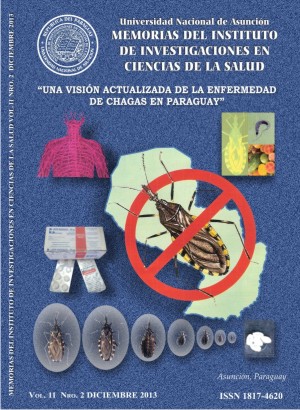Reservorios mamíferos del Trypanosoma cruzi en Paraguay
Palabras clave:
reservorios mamíferos, Trypanosoma cruzi, ParaguayResumen
La transmisión enzoótica del Trypanosoma cruzi en Paraguay aún no ha sido bien determinada. Por lo tanto, todavía se desconocen varios aspectos de la dinámica de transmisión de este parásito en el medio selvático, como ser especies de reservorios naturalmente infectados, cepas circulantes y el grado de interacción con el ciclo doméstico. Con los estudios realizados hasta la fecha, se han identificado cinco especies como reservorios naturales del T. cruzi: Didelphis azarae, Monodelphis domestica, Dasypus novemcinctus, Euphractus sexcinctus y Chaetophractus spp. en el ambiente silvestre de zonas endémicas para la enfermedad de Chagas (Chaco y San Pedro). Entre éstas se destaca la especie Dasypus novemcinctus, en la cual se ha observado una alta prevalencia de infección de alrededor del 50%. En el ambiente doméstico, se han reportado perros infectados con este parásito en mayor proporción y en menor grado gatos, reses y cerdos.
Descargas
Citas
Hoare CA. The trypanosomes of mammals. A Zoological Monograph. Oxford, UK: Blackwell Scientific Publications. 1972; p. xvii-749.
Yeo M, Acosta N, Llewellyn M, Sanchez H, Adamson S, Miles GA et al. Origins of Chagas disease: Didelphis species are natural hosts of Trypanosoma cruzi I and armadillos hosts of Trypanosoma cruzi II, including hybrids. Int J Parasitol. 2005; 35(2):225-33.
Jansen AM, Roque, ALR. Domestic and wild mammalian reservoirs. En: Telleria J, Tibayrenc M, eds. American Trypanosomiasis, Chagas disease - one hundred years of research. London: Elsevier. 2010; p. 249–76.
Canese A. Datos actualizados sobre conocimientos epidemiológicos de la enfermedad de Chagas en el Paraguay. Rev Parag Microb. 1978; 13:7-19.
Fujita O, Sanabria L, Inchaustti A, De Arias AR, Tomizawa Y, Oku Y. Animal reservoirs for Trypanosoma cruzi infection in an endemic area in Paraguay. J Vet Med Sci. 1994; 56:305-8.
Gaunt M, Miles M. The ecotopes and evolution of triatomine bugs (triatominae) and their associated trypanosomes. Mem Inst Oswaldo Cruz. 2000; 95:557-65.
Añez N, Crisante G, Soriano PJ. Trypanosoma cruzi congenital transmission in wild bats. Acta Trop. 2009; 109:78-80.
Jansen AM, Madeira FB, Deane MP. Trypanosoma cruzi infection in the opossum Didelphis marsupialis: absence of neonatal transmission and protection by maternal antibodies in experimental infections. Mem Inst Oswaldo Cruz. 1994; 89:41-5.
Lisboa CV, Mangia RH, Rubião E, de Lima NR, das Chagas Xavier SC, Picinatti A et al. Trypanosoma cruzi transmission in a captive primate unit, Rio de Janeiro, Brazil. Acta Trop. 2004; 90(1):97-106.
Chapman MD, Baggaley RC, Godfrey-Fausset PF, Malpas TJ, White G, Canese J, Miles MA. Trypanosoma cruzi from the Paraguayan Chaco: isoenzyme profiles of strains isolated at Makthlawaiya. J Protozool. 1984; 31:482-6.
Gürtler RE, Cécere MC, Rubel DN, Petersen RM, Schweigmann NJ, Lauricella MA et al. Chagas disease in north-west Argentina: infected dogs as a risk factor for the domestic transmission of Trypanosoma cruzi. Trans R Soc Trop Med Hyg. 1991; 85(6):741-5.
Gurtler RE, Cecere MC, Lauricella MA, Cardinal MV, Kitron U, Cohen JE. Domestic dogs and cats as sources of Trypanosoma cruzi infection in rural northwestern Argentina. Parasitology, 2007;134:69–82.
Cardinal MV, Lauricella MA, Ceballos LA, Lanati L, Marcet PL, Levin MJ et al. Molecular epidemiology of domestic and sylvatic Trypanosoma cruzi infection in rural northwestern Argentina. Int J Parasitol. 2008 Nov; 38(13):1533-43.
Ragone PG, Pérez Brandán C, Padilla AM, Monje Rumi M, Lauthier JJ, Alberti D'Amato AM et al. Biological behavior of different Trypanosoma cruzi isolates circulating in an endemic area for Chagas disease in the Gran Chaco region of Argentina. Acta Trop. 2012; 123(3):196-201.
Rosypal AC, Corte´s-Vecino JA, Gennari SM, Dubey JP, Tidwell RR, Lindsay DS. Serological survey of Leishmania infantum and Trypanosoma cruzi in dogs from urban areas of Brazil and Colombia. Vet Parasitol. 2007; 149:172–7.
Roque ALR, Jansen AM. Importância dos animais domésticos sentinelas na identificação de áreas de risco de emergência de doença de Chagas. Rev Soc Bras Med Trop. 2008; 41:191–193.
Crisante G, Rojas A, Teixeira MM, Añez N. Infected dogs as a risk factor in the transmission of human Trypanosoma cruzi infection in western Venezuela. Acta Trop. 2006; 98:247–54.
Estrada-Franco JG, Bhatia V, Diaz-Albiter H, Ochoa-Garcia L, Barbabosa A, Vazquez-Chagoyan JC et al. Human Trypanosoma cruzi infection and seropositivity in dogs, Mexico. Emerg Infect Dis. 2006; 12(4):624-30.
Jiménez-Coello M, Guzmán-Marín E, Ortega-Pacheco A, Acosta-Viana KY. Serological survey of American trypanosomiasis in dogs and their owners from an urban area of Mérida Yucatán, México. Transbound Emerg Dis. 2010; 57(1-2):33-6.
Pineda V, Saldaña A, Monfante I, Santamaría A, Gottdenker NL, Yabsley MJ et al. Prevalence of trypanosome infections in dogs from Chagas disease endemic regions in Panama, Central America. Vet Parasitol. 2011; 178(3-4):360-3.
Falla A, Herrera C, Fajardo A, Montilla M, Vallejo GA, Guhl F. Haplotype identification within Trypanosoma cruzi I in Colombian isolates from several reservoirs, vectors and humans. Acta Trop. 2009; 110:15–21.
Zuriaga MA, Blandón-Naranjo M, Valerio-Campos I, Salas R, Zeledón R, Bargues MD. Molecular characterization of Trypanosoma cruzi and infection rate of the vector Triatoma dimidiata in Costa Rica. Parasitol Res. 2012; 11:1615-20.
Beard CB, Pye G, Steurer FJ, Rodriguez R, Campman R, Peterson AT et al. Chagas disease in a domestic transmission cycle, southern Texas, USA. Emerg Infect Dis. 2003; 9:103–5.
Mem. Inst. Investig. Cienc. Salud, Vol. 9(2) Diciembre 2013: 96-96 96
Brown EL, Roellig DM, Gompper ME, Monello RJ, Wenning KM, Gabriel MW, et al. Seroprevalence of Trypanosoma cruzi among eleven potential reservoir species from six states across the southern United States. Vector Borne Zoonotic Dis. 2010; 10(8):757-63.
Bern C, Kjos S, Yabsley MJ, Montgomery SP. Trypanosoma cruzi and Chagas' Disease in the United States. Clin Microbiol Rev. 2011; 24(4):655-81
Patel JM, Rosypal AC, Zimmerman KL, Monroe WE, Sriranganathan N, Zajac AM et al. Isolation, mouse pathogenicity, and genotyping of Trypanosoma cruzi from an English Cocker Spaniel from Virginia, USA. Vet Parasitol. 2012; 187(3-4):394-8.
Castañera MB, Lauricella MA, Chuit R, Gurtler RE. Evaluation of dogs as sentinels of the transmission of Trypanosoma cruzi in a rural area of north-western Argentina. Ann Trop Med Parasitol. 1998; 92:671–83.
Herrera L, D’Andrea PS, Xavier SCC, Mangia RH, Fernandes O, Jansen AM. Trypanosoma cruzi infection in wild mammals of the National Park ‘‘Serra da Capivara’’, and its surroundings (Piauí, Brazil), endemic for Chagas disease. Trans R Soc Trop Med. Hyg. 2005; 99:379-88.
Valente VC, Valente SA, Noireau F, Carrasco HJ, Miles MA. Chagas disease in Amazon basin: association of Panstrongylus geniculatus (Hemiptera: Reduviidae) with domestic pigs. J Med Entomol. 1998; 35:99-103.
Salazar-Schettino PM, Bucio MI, Cabrera M, Bautista J. First case of natural infection in pigs. Review of Trypanosoma cruzi reservoirs in Mexico. Mem Inst Oswaldo Cruz. 1997; 92(4):499-502.
Correa V, Briceno J, Zuniga J, Aranda JC, Valdes J, Contreras MC et al. Infección por Trypanosoma cruzi en animales domésticos de sectores rurales de la IV región Chile. Bol Chil Parasit. 1982; 37:27-8.
Rozas M, Botto-Mahan C, Coronado X, Ortiz S, Cattan PE, Solari A. Short report: Trypanosoma cruzi infection in wild mammals from a chagasic area of Chile. Am J Trop Med Hyg. 2005; 73(3):517-9.
Barr SC, Van Beek O, Carlisle-Nowak MS, Lopez JW, Kirchhoff LV, Allison N, Zajac A et al. Trypanosoma cruzi infection in Walker hounds from Virginia. Am J Vet Res. 1995; 56(8):1037-44.














